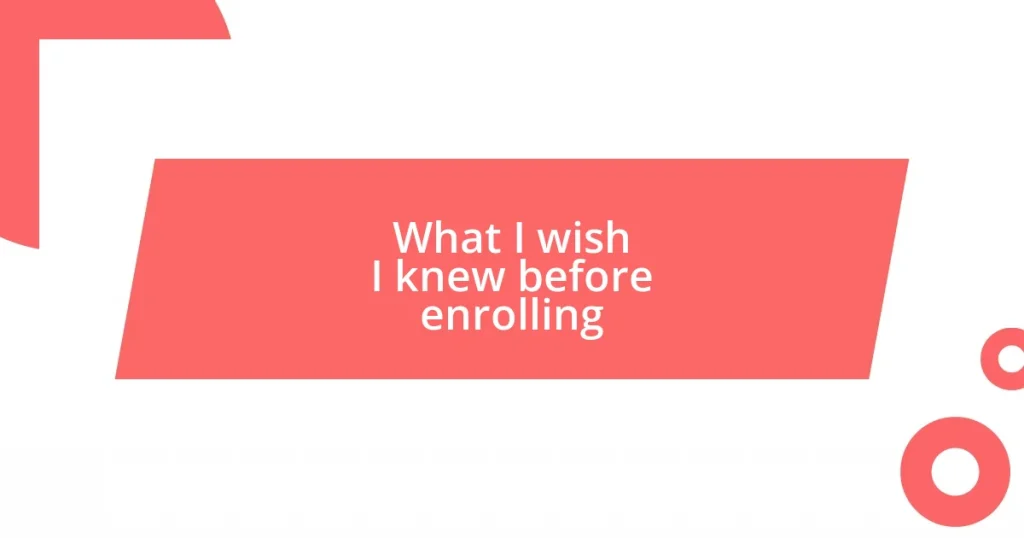Key takeaways:
- The enrollment decision is crucial and should align with both career goals and personal values, requiring careful consideration of various factors, including program structure, institution reputation, and financial implications.
- Self-assessment is vital for understanding one’s strengths, weaknesses, and interests, helping to identify the most suitable educational path and ensuring that choices resonate with personal beliefs.
- Thorough research on programs, including learning outcomes, faculty quality, and alumni success stories, can significantly enhance the educational experience and inform future career decisions.
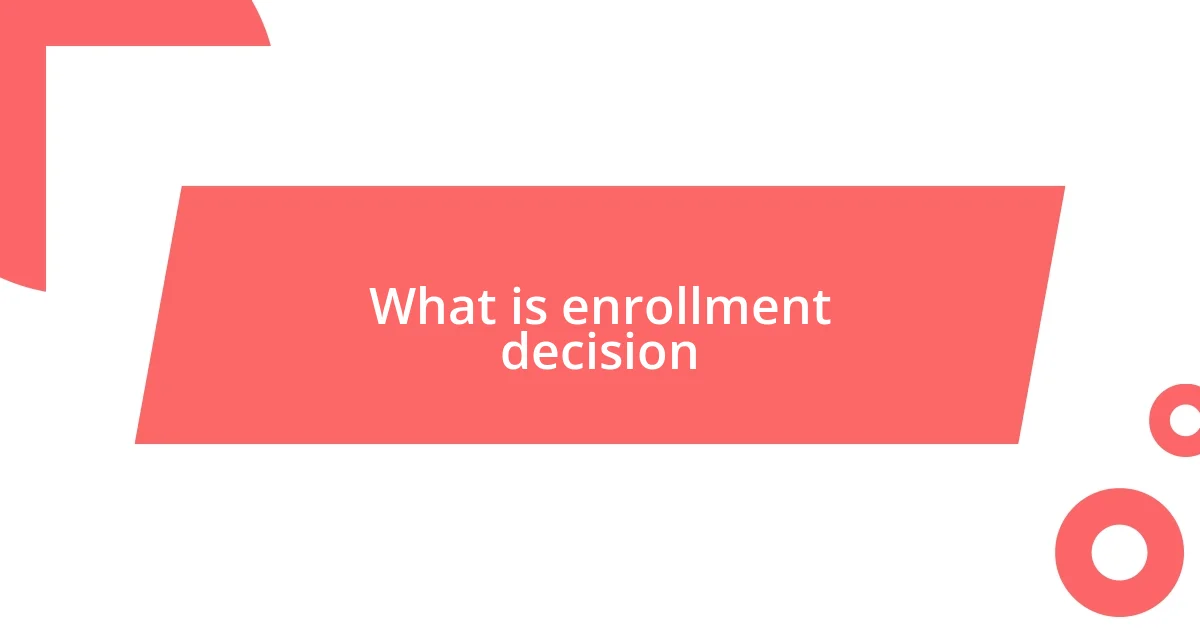
What is enrollment decision
The enrollment decision is more than just a practical step; it’s a pivotal moment that shapes your educational journey. When I was deciding on my program, I felt the weight of the world on my shoulders, wondering if I was making the right choice for my future. Did you ever feel that way, caught between excitement and anxiety?
This decision involves weighing various factors, such as program quality, cost, and future career prospects. I remember poring over brochures late into the night, juggling the pros and cons like a tightrope walker balancing my dreams with reality. It’s a delicate dance; every choice carries potential implications that can affect your life for years to come.
Ultimately, the enrollment decision should align not just with your career goals but also with your personal values and interests. I realized that I needed to choose a path that felt authentic to me, rather than just a safer option. So, what resonates with you? What sparks your passion? These questions can guide you through the sometimes overwhelming process of enrollment.
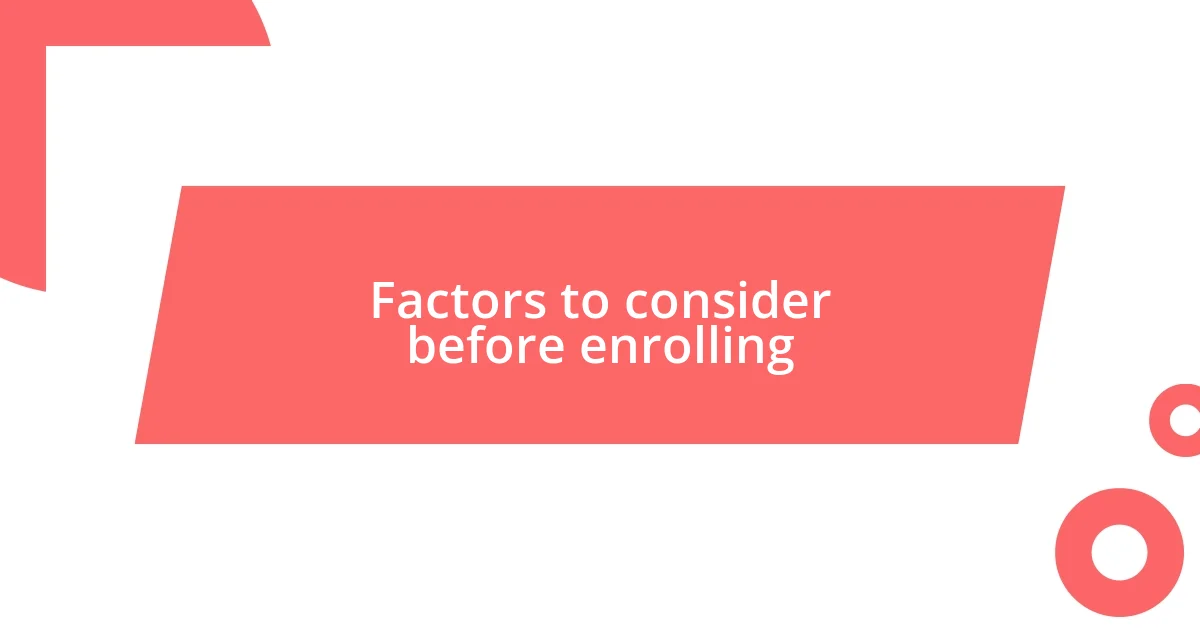
Factors to consider before enrolling
Determining the right program involves assessing a few critical factors. One that I wish I had thought more about was the program structure. When I chose my course, I jumped in without fully understanding how the modules fit together. It wasn’t until later that I realized some foundational classes were missing, making it harder to grasp advanced topics. Have you ever felt overwhelmed by a lack of clarity in a program?
Another aspect to consider is the institution’s reputation and support services. I didn’t fully appreciate how a college’s networking opportunities could impact my career. After graduation, I wished I could tap into a more established alumni network, which could have opened doors for internships and job placements. Are you considering how support services like career counseling and tutoring could aid your journey?
Lastly, financial implications are paramount. When I enrolled, I focused mainly on tuition costs but overlooked hidden fees like textbooks and extracurricular expenses. Understanding the full financial landscape can save you from surprises down the road. Have you taken a comprehensive look at the total cost of your education?
| Factor | Consideration |
|---|---|
| Program Structure | Does it align with your goals? |
| Institution Reputation | What networking opportunities exist? |
| Financial Implications | Are there hidden costs to factor in? |
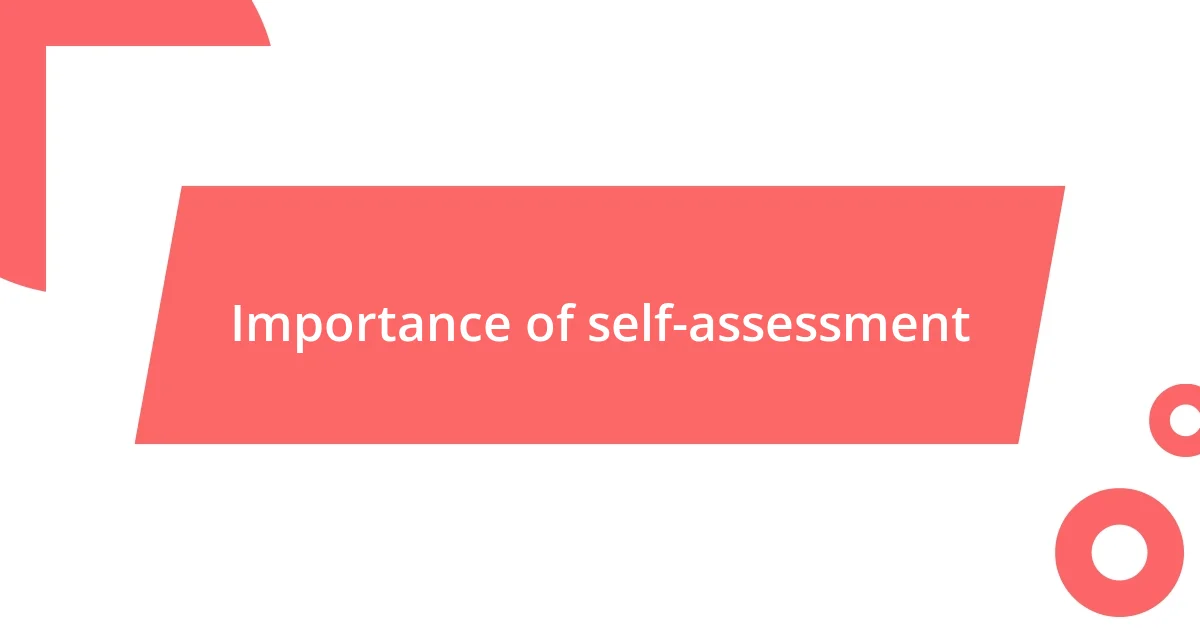
Importance of self-assessment
Self-assessment is an essential step that often gets overshadowed in the excitement of enrolling. I remember sitting alone in my room, reflecting on my skills and interests before making my choice. That moment of honesty with myself laid the groundwork for my success. By truly understanding what I wanted out of my education, I could make informed decisions that aligned with my personal goals instead of blindly following trends or external pressures. Have you taken the time to think deeply about what you want?
- Understanding your strengths and weaknesses helps in choosing the right program.
- Self-reflection can reveal interests you didn’t know you had, guiding your career aspirations.
- Considering your values ensures that your choice resonates with your personal beliefs and lifestyle.
Taking the time to assess where I stood before enrolling made a significant difference. There were days I felt like a puzzle with missing pieces, unsure of how to fit everything together. When I finally dug deep and evaluated my motivations and preferences, it became clear which programs would nourish my growth rather than hinder it. Self-assessment empowers you, providing clarity amidst the chaos. Leveraging this insight can pave the way for a fulfilling educational journey, supporting not only what I want to achieve but who I want to be.
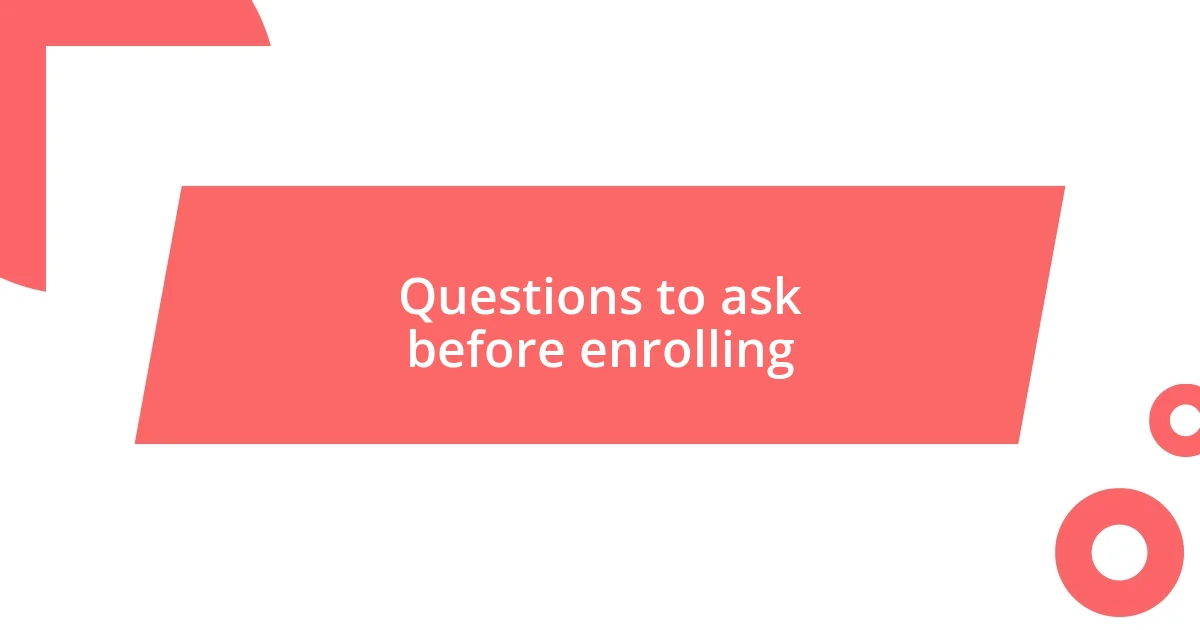
Questions to ask before enrolling
When contemplating enrollment, it’s essential to ask about the program’s learning outcomes. I recall a time when I enrolled without fully grasping what skills I would gain. Looking back, I wish I had probed deeper into how the program would not only challenge me but also equip me for future job markets. It makes me wonder—do you know what measurable skills you’ll walk away with?
Another essential question revolves around class sizes and instructor accessibility. In my experience, small class sizes foster a sense of community and allow for more personalized attention. I fondly remember some of my professors who offered office hours, turning an intimidating subject into engaging discussions. Have you thought about how much interaction with faculty can enhance your educational experience?
Lastly, exploring extracurricular activities and community involvement is crucial. I didn’t realize how much I would grow from clubs and organizations related to my field until I jumped in. The connections and experiences I gained through these activities enriched my studies and provided valuable networking opportunities. Are you aware of what clubs or organizations are available to help broaden your experience beyond the classroom?
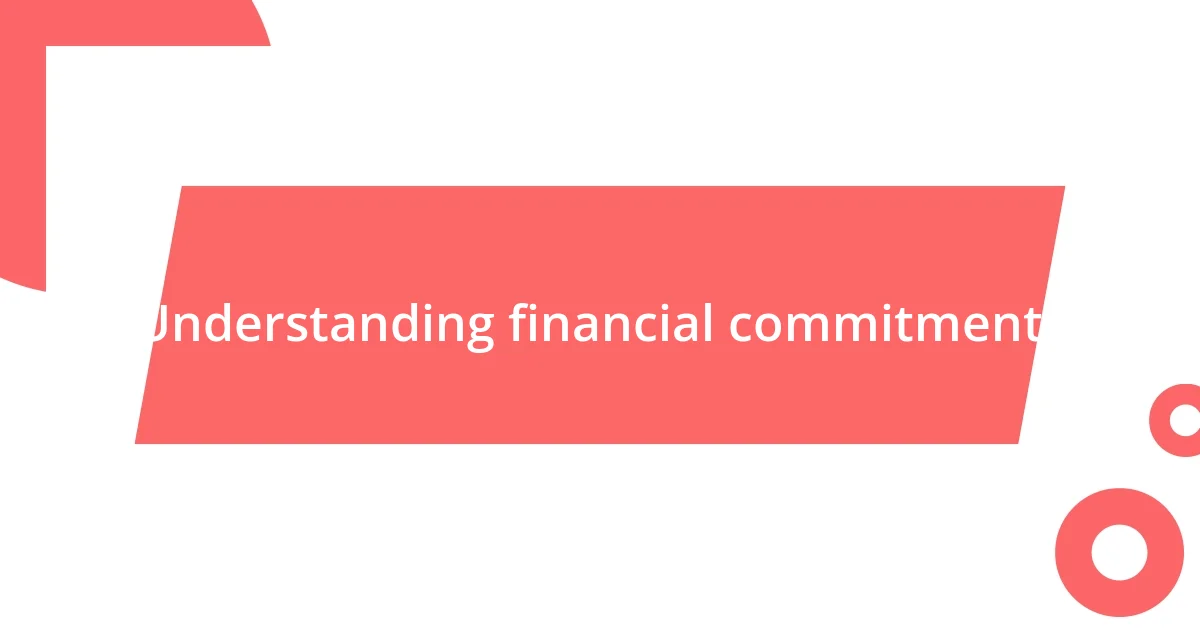
Understanding financial commitments
Understanding the financial aspect of enrolling is often underestimated. I vividly recall the moment I opened my acceptance letter and was met with a long list of expenses. Tuition, books, housing, and even those little fees that seem to pop up can quickly stack up. How often do we calculate not just the tuition but all the hidden costs involved?
Budgeting became my constant companion as I navigated this new chapter. One night, while sitting at my kitchen table with a pile of bills, I realized how crucial it was to track my spending. By creating a simple spreadsheet, I gained a clearer picture of my finances. This eye-opening experience taught me to prioritize my expenses and even look for scholarships and financial aid options. Have you considered how a detailed financial plan can alleviate stress down the line?
What surprised me most was the ongoing nature of financial commitments. Even after paying the upfront costs, I found myself juggling monthly expenses like commuting and textbooks. I remember one semester feeling overwhelmed when I had to pay for unexpected supplies for a project I hadn’t planned for. That taught me a valuable lesson about setting aside a contingency fund for those unforeseen expenses. Have you thought about how preparing for the unexpected can bring peace of mind as you embark on your educational journey?
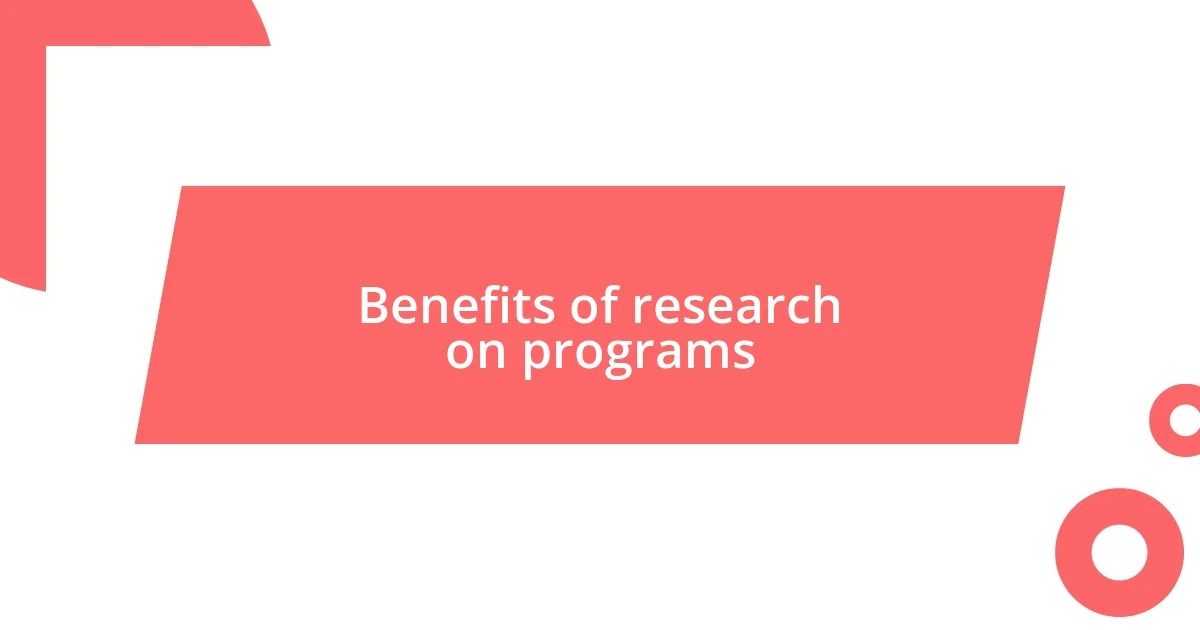
Benefits of research on programs
Researching programs before enrollment can transform your educational journey. I remember sifting through various courses, and it struck me how little I knew about the curriculum. By diving deep into course details, I discovered elective options that matched my interests perfectly, leading me to a project that sparked my passion in unexpected ways. Have you ever felt the thrill of uncovering a hidden gem in a program?
It’s not just about the classes, though. As I started exploring faculty backgrounds, I was amazed to find instructors who specialized in areas I found intriguing. This kind of insight made me realize that the quality of mentorship can significantly shape one’s learning experience. Think about it—how much do you value being mentored by someone who genuinely excites you about their research and career?
Additionally, understanding the program’s reputation within the industry can greatly influence your career post-graduation. I stumbled upon alumni testimonials that opened my eyes to the paths my predecessors took, which gave me a sense of direction as I was making my own choices. Have you considered how the success stories of other graduates might motivate you to pursue your dreams? It’s these layers of research that truly illuminate what to expect and how to navigate your educational path effectively.
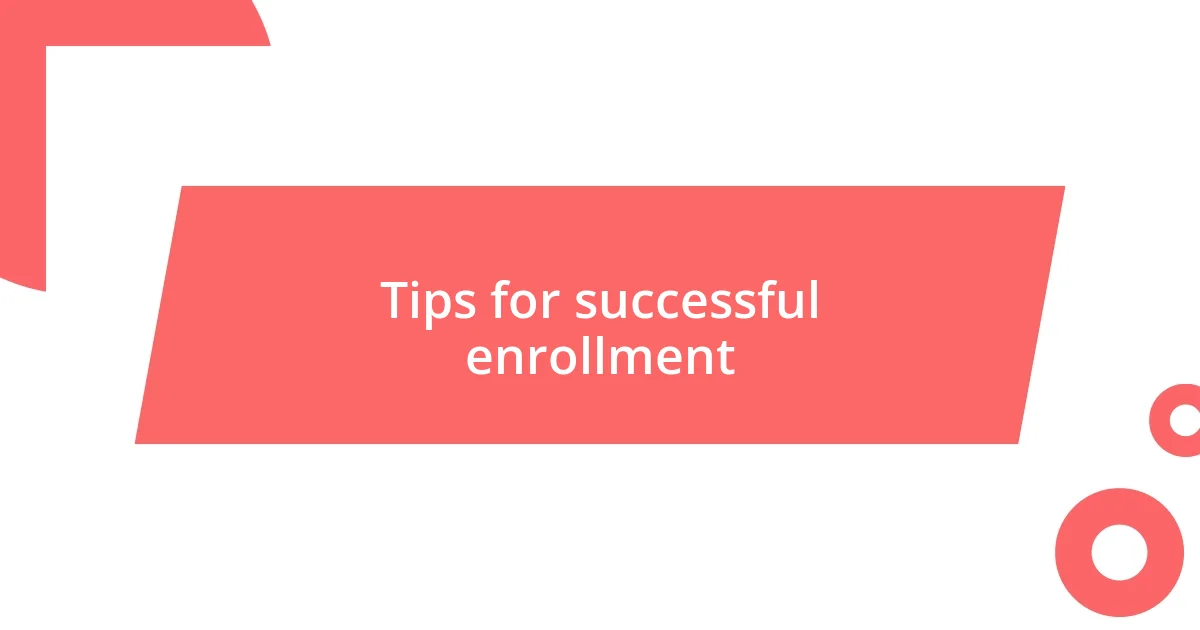
Tips for successful enrollment
When it comes to successful enrollment, ensuring that your paperwork is in order is paramount. I still remember the stress of scrambling last minute to gather documents and missing vital deadlines. Marking important dates on a calendar not only kept me organized but also helped prevent unnecessary panic. Have you ever felt that last-minute rush? It’s a feeling I wouldn’t wish upon anyone!
Another vital tip is to connect with current students. Reaching out to peers can offer insights that no official brochure conveys. I recall grabbing coffee with an upperclassman who shared not just academics but also campus experiences I’d never have imagined. Their candid take on time management and social life made all the difference in my approach to enrollment. Have you thought about the value of learning from someone who’s walked the path before you?
Don’t underestimate the power of a campus visit, even if it’s virtual. When I had a chance to explore my future campus online, it ignited a spark of excitement. I saw student interactions, cultural events, and even the dining hall vibe. It helped me visualize my place in this new environment, which ultimately made the transition smoother. Have you taken the time to immerse yourself in the atmosphere where you’ll be learning?










